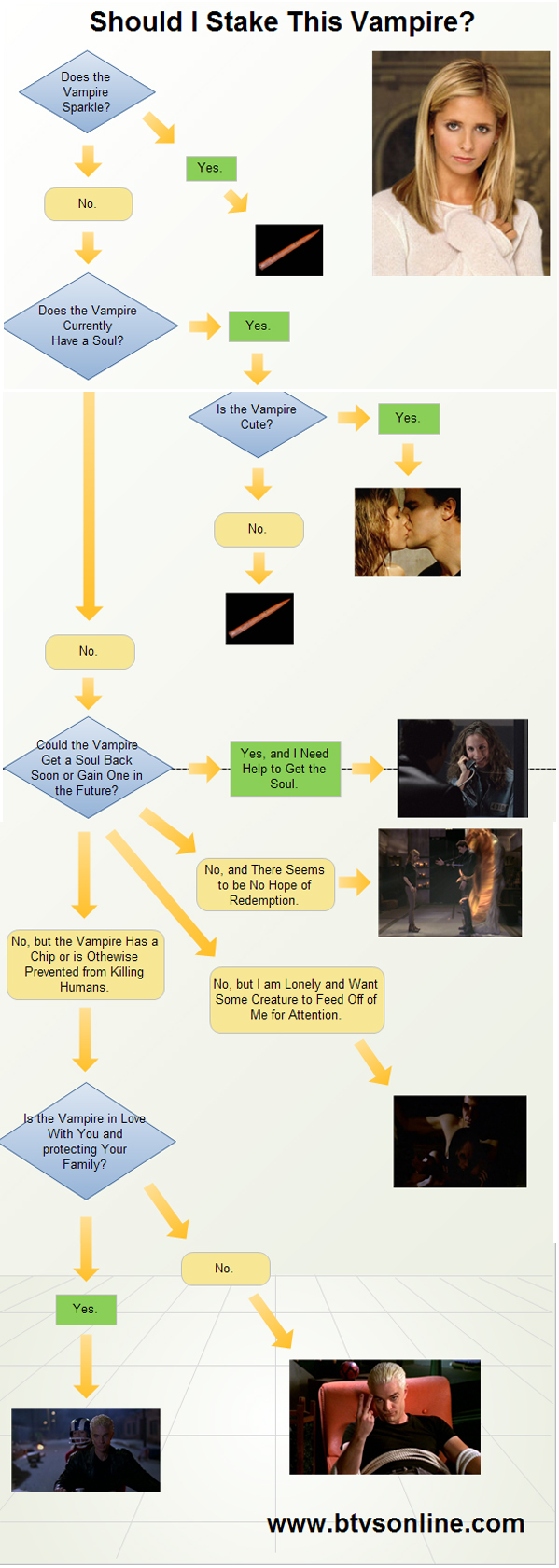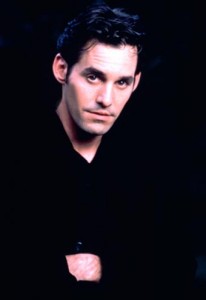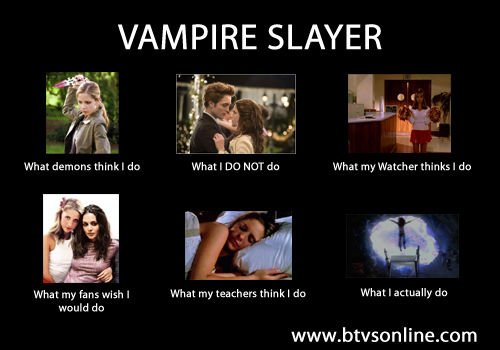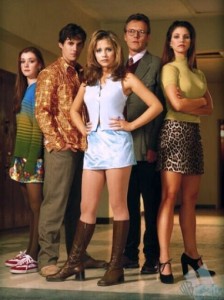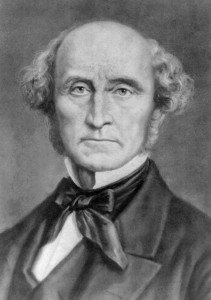 Editor’s note: Want to contribute a guest blog? Contact us.
Editor’s note: Want to contribute a guest blog? Contact us.
By Samuel Scott
In a prior post, we addressed the issue of whether Aristotle (through his work “Nicomachean Ethics“), would think Buffy is an ethical person and warrior. In this essay, we wanted to examine the same issue — but in the context of the utilitarian philosophy advocated in the nineteenth century by John Stuart Mill and his mentor, Jeremy Bentham.
In contrast to ethical systems that rely on idealistic axioms (such as Aristotle’s “Golden Mean” and Immanuel Kant’s categorical imperative), utilitarianism is more practical and based on realistic, worldly concerns. Without going into too much detail here, the core concept of utilitarianism is the following (from Mill’s “Utilitarianism”) summary by SparkNotes of the so-called Greatest Happiness Principle:
This principle holds that “actions are right in proportion as they tend to promote happiness, wrong as they tend to produce the reverse of happiness. By happiness is intended pleasure, and the absence of pain; by unhappiness, pain, and the privation of pleasure.” Pleasure and the absence of pain are, by this account, the only things desirable as ends in themselves, the only things inherently “good.”
In other words, the most-ethical choice between two or more actions, according to utilitarianism, is that which will create the most pleasure and/or the most absence of pain among the greatest number of people. All other concerns are secondary at the most or irrelevant at the least. In fact, one can argue that “the ends justify the means” in utilitarianism since the end (pleasure or the lack of pain) is what determines whether an action is ethical.
So, if we accept this paradigm as our guide for moral behavior, then the next question comes naturally: Is Buffy a utilitarian? At first, the answer seems to be “yes.” After all, Buffy — just like all of the slayers before and after her — has a role whose duty is to do whatever it takes to slay demons and vampires while preventing apocalypses from occurring from to time. The general role of the slayer is strictly utilitarian — the job is to minimize the amount of pain that humans will feel by being killed by vampires, sucked into a “hell dimension,” or suffering another of many other possible, painful ends.
Buffy’s Transitions in Utilitarianism
From what we see of other slayers, they were certainly utilitarian. The slayer mother of Robin Wood, the last principal of Sunnydale High School, neglected her young son because, as she told him, “the mission is what matters.” Kendra, who was called to duty after Buffy briefly died in Season One, was raised as a potential without friends, worldly concerns, and interactions with “boys.” The First Slayer tried to kill the Scoobies in the finale of Season Four because Buffy’s behavior was, in her view, unnatural — she had friends and was not wholly devoted to her utilitarian duty.
Buffy deviated from the behavior of prior slayers at the outset. Quickly and over the years, her actions were decidedly not utilitarian:
- Buffy does not kill Angel because he is a vampire with a soul
- Buffy does not kill Oz because he is a werewolf only three days out of the month
- Buffy does not kill Spike once he had a government chip inserted into his brain that renders him harmless (and, later, had a soul as well)
Each of these actions resulted in later pain suffered by humans. Angel, when he lost his soul, killed Jenny and tried to end the world (not counting the pain he sometimes caused in his spin-off TV show). Oz’s life as a werewolf caused suffering to Willow and others in Seasons Three and Four. Post-chip Spike, before he fell in love with Buffy and while later under control of the First, killed people, plotted against the Scoobies, and tried to rape Buffy in Season Six. In just these three examples, less pain would have been caused to people had Buffy killed the people in question. (This leads to another question: Is Buffy, then, ultimately responsible for the deaths and suffering caused by these people later?) As such, it is clear that Buffy — whether right or wrong — had always considered moral factors other than just practical utility. After all, the slayer told Kendra in Season Two that her friends are “total assets.”
The two most prominent examples of Buffy’s anti-utilitarianism (to create a word, perhaps) are in Seasons Five and Seven. In the former example, hell-god Glory is going to kill Buffy’s sister Dawn as part of a ritual that will open a gateway to her home dimension and destroy the world as a side-effect. In cold, rational terms, the utilitarian would say that Dawn should be killed before the ritual. After all, the pain caused to one person would be overcome in ethical terms by preventing the pain caused to billions of people. But Buffy eliminates that option (whether out of familial love or an adherence to a different moral system). Just remember this exchange in the Season Five finale “The Gift”:
Buffy: Pretty simple math here. We stop Glory before she can start the ritual. We still have a couple of hours, right?
Giles: If my calculations are right. But Buffy —
Buffy: I don’t wanna hear it. (turns away)
Giles: I understand that —
Buffy: (whirls back) No! No, you don’t understand. We are not talking about this.
Giles: (jumps up from the table, yells) Yes, we bloody well are!
Giles: (quieter) If Glory begins the ritual … if we can’t stop her…
Buffy: Come on. Say it. We’re bloody well talking about this. Tell me to kill my sister.
Giles: (whispers) She’s not your sister.
Buffy: (pause) No. She’s not. She’s more than that. She’s me. The monks made her out of me. I hold her … and I feel closer to her than … (looks down, sighs) It’s not just the memories they built. It’s physical. Dawn … is a part of me. The only part that I — (stops)
Willow: We’ll solve this. We will. Don’t have another coma, okay?
Giles: (quietly) If the ritual starts, then every living creature in this and every other dimension imaginable will suffer unbearable torment and death … (looks up at Buffy) including Dawn.
Buffy: Then the last thing she’ll see is me protecting her.
Giles: (quietly) You’ll fail. You’ll die. We all will. (turns away from the table)
Buffy: I’m sorry.
[later]
Buffy: Everybody knows their jobs. Remember, the ritual starts, we all die. And I’ll kill anyone who comes near Dawn.
However, in Season Seven, Buffy does become more utilitarian. Whether it is a result of her post-resurrection malaise, her getting older and more cynical, or her reaction to the nature of the fight against the First, she does act as a cold general of her army of potential slayers. Just as officers send soldiers into battle knowing that some will die but try to minimize the number of deaths, so does Buffy do the same through her speeches and actions. Her (utilitarian) goal is to save the world no matter what the cost. Buffy tells Giles in “Lies My Parents Told Me” that her earlier decision not to consider a sacrifice of Dawn was wrong:
Giles: We’re on the verge of war. It’s time you looked at the big picture.
Buffy: Hello! All I do is look at the big picture. The other day, I gave an inspirational speech to the telephone-repair man.
Giles: It takes more than rousing speeches to lead, Buffy. If you’re going to be a general, you need to be able to make difficult decisions regardless of cost.
Buffy: Giles, we had this conversation when I told you that I wouldn’t sacrifice Dawn to stop Glory from destroying the world.
Giles:: Ah, yes, but things are different, aren’t they? After what you’ve been through, faced with the same choice now, (paces) you’d let her die.
Buffy: If I had to…to save the world. Yes.
Earlier that same season, Buffy immediately decided to kill Anya after discovering that she had chosen (for a second time) to become a vengeance demon and kill humans. (Earlier, Buffy did not kill fellow Scoobies who posed potential, future threats, and she did not kill Willow after she had killed Warren and tried to end the world in grief after Tara’s accidental death in Season Six.) Buffy also held a knife to a crying Andrew’s throat and made him believe in Season Seven’s “Storyteller” that she was going to kill him to close the seal leading to the Hellmouth below Sunnydale High School. Buffy did not start out as a utilitarian, but she became one.
The Utilitarian Watchers’ Council
As we can see, Buffy’s behavior specifically was less than utilitarian until Season Seven — she was usually motivated by additional factors including her own moral paradigm and her desire to help her loved ones. However, the true utilitarians in “Buffy the Vampire Slayer” had always been the Watchers’ Council itself — and, thereby, Giles himself as well.
Since time immemorial, the Watchers’ Council had guided slayers in the fight against evil. They had been the generals leading the slayers over the centuries. (Although, as we learn in Season 7, there was someone watching the watchers.) As such, they had a utilitarian responsibility: To oversee the battle against evil, no matter what the cost. As a result, their tactics have always been viewed as controversial (to say the least). In the Season 3 episode “Helpless,” they had Giles inject Buffy (on her eighteenth birthday) with a serum that would eliminate her supernatural strength while fighting a psychotic vampire. The goal was to see whether the slayer could think “on her feet” as an average human without the slayer ability. After the successful test, which the council had always done to slayers on their eighteenth birthdays, we see the following dialogue:
Quentin: You think the test was unfair?
Buffy: I think you better leave town before I get my strength back.
Quentin: We’re not in the business of fair, Miss Summers, we’re fighting a war.
Giles: You’re waging a war. She’s fighting it. There is a difference.
The theme of the episode, of course, was that the Watchers’ Council is evil at worst or misguided at best. However, I would argue that their utilitarian motivation is understandable — even if, perhaps, their tactics were not morally reputable all of the time. In war, motivations matter. If a soldier dies in a country’s fight to, say, gain land or an energy resource, then that has less of an altruistic element. A utilitarian strategy — sacrificing soldiers to achieve the goal — is less ethical in this case. However, the goal of the Watchers’ Council is indeed altruistic — they want to save the world. In “Helpless,” they wanted to ensure that the slayer was as good as possible. Just as generals must sent soldiers into battle knowing that some will die, so does the Watchers’ Council know that another slayer will be called if something were to happen to Buffy.
The strain of utilitarianism in the Watchers’ Council is evident in Giles’ behavior in Season Five. After all, he could not have undergone all of the years of training and later service without subconsciously adopting at least some of the organizational culture. After Glory had been stopped but still had shared bodies with Ben, a human doctor, at the end of Season Five, Buffy refused to kill a critically-injured Ben even though doing so would have prevented Glory from re-emerging ever again. Giles, however, did not refuse:
Giles: Can you move?
Ben: Need a … a minute. She could’ve killed me.
Giles: No she couldn’t. Never. And sooner or later Glory will re-emerge, and … make Buffy pay for that mercy. And the world with her. Buffy even knows that… and still she couldn’t take a human life.
Giles: She’s a hero, you see. She’s not like us.
Ben: Us?
[Giles suffocates Ben.]
In this short but powerful scene, we see the difference between “warriors” and “heroes.” All heroes are warriors, but not all warriors are heroes. The Watchers’ Council, Ben, and Giles are warriors — they do whatever it takes to achieve their military goals and are essentially utilitarians. Buffy, at least for most of the series, is a hero — she balances the need to win the battle with the need to act in a moral and ethical manner as well. As such, a warrior could kill Ben but a hero could not. Heroes, like Achilles in ancient Greece, are not strict utilitarians — they ultimately serve a higher, moral calling (like showing mercy) and not just the need to win a war. Buffy is just the latest example of this long-running archetype.
Samuel Scott is the founder and publisher of Buffy the Vampire Slayer Online. You can follow him on Facebook, LinkedIn, Google+, and Twitter as well as on his personal website.
Like this post? Submit it to Whedonesque!

